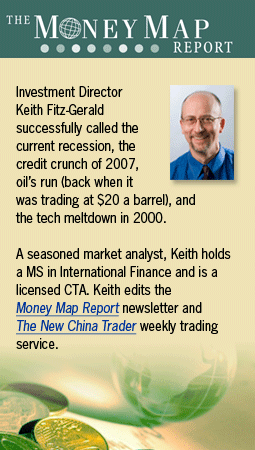By Keith Fitz-Gerald
Investment Director
Money Morning/The Money Map Report
"Why don't my traditional analytics work as well anymore?"
It's a question I get a lot. But chances are, it's not your analytics that have broken down. It's your execution that's not keeping up.
Let me explain.
In the past several years, we've witnessed an explosion in do-it-yourself trading platforms. Ironically, many are offshoots of the very platforms institutional traders use to trade anonymously (and to great advantage) in the so-called "dark pools" I wrote about recently.
So you could say that it's easier - literally - than ever before to "trade."
But what Wall Street doesn't tell you is that the "big boys" have an additional layer of sophistication at their disposal. And it's one that gives them the upper hand when it comes to profits: Order execution algorithms.
If you've never heard of these things before, don't feel bad. Most people who don't trade for a living or who aren't intimately connected to the markets on a daily basis haven't heard the term, despite the fact that nearly 30% of all EU and U.S. equities volume is traded this way today. And that number is increasing - almost 50% of those equities will be traded in this manner by 2010.
Order execution algorithms are sophisticated quantitative routines that combine actual analysis with the buying and selling process. This method of trading is widely used by hedge funds, mutual funds, pension funds and other institutional traders in order to manage market impact, opportunity cost, and "price risk," meaning their sole function is to obtain the best prices possible.
And, in a manner that would make Gordon Gekko proud, many such order execution algorithms are also designed to camouflage actual buying and selling decisions. This increasingly allows large traders to gain the upper hand when they want to move in and out of certain financial instruments because the rest of the market will neither see them coming nor going.

The reason such secrecy is important is that when other traders know a stock is "in play" they can manipulate the price to their own advantage and at these volumes, sometimes a penny or two is all it takes per share.
To an average investor, paying a few more cents per share may be immaterial but to an institutional trader moving hundreds of thousands or even millions of shares at once, there's a huge impact that can mean the difference between winning and losing.
But where order routines are really effective is that many incorporate elements of artificial intelligence - I know this first hand because I helped write some of the first order routine algorithms used to beat Wall Street at its own game.
This means the computers can place orders based on electronic information - many times before their human masters are even aware of the information. This gives them a huge quantitative advantage for obvious reasons.
And that, in as much as stock selection, is the name of the game when it comes to today's markets.
So what can we do about it?
Ironically, that's the easy part.
First, despite the fact that institutional investors are increasingly focused on short-term execution risk, none of the long-term relationships governing stock price and selection are rendered invalid.
That means investors who lengthen their time horizon and who do something as simple as use dollar cost averaging - or use its close cousin, value averaging - to buy into a position or utilize rudimentary options strategies may actually be able to beat the institutions at their own game.
Second, even though algorithmic trading has made short-term pricing swings more violent, it's ironically made longer-term information more clear. If prices are going up, the big boys are buying. If they're going down, chances are they're selling.
So the key is something we stress daily:
- Find those companies with superior fundamentals,
- A substantial portion of their business outside the US (which will be hurting for a long time to come),
- And then buy selectively.
News and Related Story Links:
-
Money Morning:
Make Up Market Losses With Value Averaging
About the Author
Keith is a seasoned market analyst and professional trader with more than 37 years of global experience. He is one of very few experts to correctly see both the dot.bomb crisis and the ongoing financial crisis coming ahead of time - and one of even fewer to help millions of investors around the world successfully navigate them both. Forbes hailed him as a "Market Visionary." He is a regular on FOX Business News and Yahoo! Finance, and his observations have been featured in Bloomberg, The Wall Street Journal, WIRED, and MarketWatch. Keith previously led The Money Map Report, Money Map's flagship newsletter, as Chief Investment Strategist, from 20007 to 2020. Keith holds a BS in management and finance from Skidmore College and an MS in international finance (with a focus on Japanese business science) from Chaminade University. He regularly travels the world in search of investment opportunities others don't yet see or understand.



